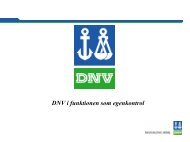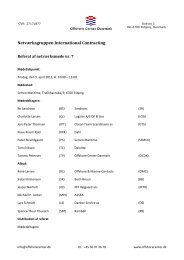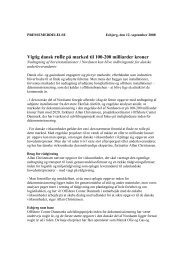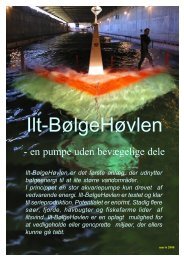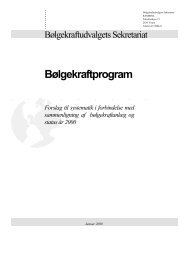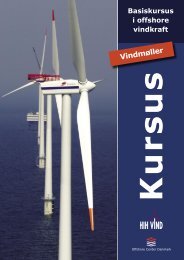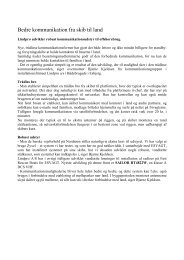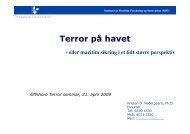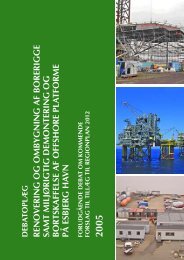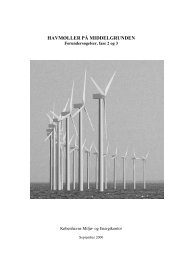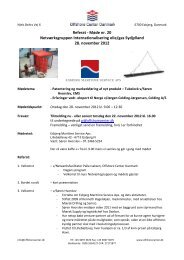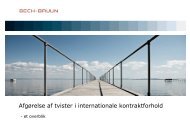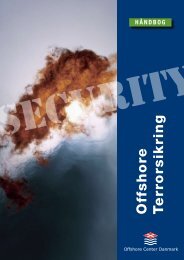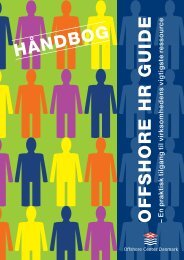Read News Magazine (pdf) - Offshore Center Danmark
Read News Magazine (pdf) - Offshore Center Danmark
Read News Magazine (pdf) - Offshore Center Danmark
Create successful ePaper yourself
Turn your PDF publications into a flip-book with our unique Google optimized e-Paper software.
15<br />
10<br />
5<br />
0<br />
98 00 02 04 06<br />
Mobile installations<br />
Stationary installations<br />
operators, before any fi nal approval can be<br />
given to the construction, Hans Erik<br />
Christensen states.<br />
”Just like legislating on<br />
moon travel”<br />
At Esbjerg Safety Consult A/S consultancy<br />
is given to offshore companies on implementation<br />
of the new <strong>Offshore</strong> Safety Act. The<br />
impression here is that the new law will have<br />
an impact on only a few companies – namely<br />
operators and rig owners.<br />
Accident frequency for offshore installations.<br />
Accidents per million working<br />
hours.<br />
- The new <strong>Offshore</strong> Safety Act is a little<br />
like legislating on moon travel. The law is<br />
directed towards a small group of operators,<br />
and for all other companies the law has practically<br />
no implications, is the judgement from<br />
consultant H.C. Dahlerup Koch, Esbjerg<br />
Safety Consult.<br />
- The behaviour of most suppliers or subsuppliers<br />
is to a larger extent governed by<br />
regulations on working environment. With<br />
respect to the new law, basically the supplier<br />
will primarily ensure that the employees have<br />
attended the required safety courses, H.C.<br />
Dahlerup Koch continues.<br />
”Mutual Recognition of Safety<br />
Training”<br />
Within the companies supplying courses for<br />
safety and certifi cation, the new <strong>Offshore</strong><br />
Key issues of offshore safety law<br />
The <strong>Offshore</strong> Safety Act was approved in July 2006, and was enforced by May 2007.<br />
Full implementation is expected by early 2009. One of the main principles of the law<br />
is the requirement to training of personnel to ensure the highest safety standards of all<br />
oil producing nations.<br />
- All employees on mobile or stationary oil installations must within the past 4 years<br />
have undergone fundamental safety training within fi rst aid, helicopter transport,<br />
maritime safety, fi re extinguishing and personnel safety.<br />
- <strong>Offshore</strong> employees must be able to perform fi rst aid following accidents or sudden<br />
illness. Furthermore they shall be able to operate transportable fi re extinguishing<br />
equipment and they must have theoretical knowledge with regards to prevention and<br />
fi ghting of fi res.<br />
- The procedures must be known with regards to safety precautions by helicopter<br />
transport, so that employees have a good knowledge of emergency procedures, emergency<br />
equipment and practical survival techniques.<br />
It is the responsibility of the operators to ensure that all employees have been trained<br />
adequately. Also according to the <strong>Offshore</strong> Safety Act, the companies operating<br />
offshore are obliged to ensure that the quality of the training has been evaluated by an<br />
external and impartial auditor.<br />
NSOAF -<br />
North Sea <strong>Offshore</strong><br />
Authorities<br />
Forum<br />
The NSOAF is an international corporation<br />
between authorities in oil-producing<br />
countries surrounding the North Sea.<br />
The work undertaken is primarily done<br />
amongst two permanent working groups,<br />
one related to safety, health and environment<br />
and one related to training and<br />
education.<br />
The working group within safety,<br />
health and environment concentrates on<br />
harmonising the requirements to safety<br />
and health on offshore installations - the<br />
essence of the SSR statement mentioned<br />
in the Danish Act of <strong>Offshore</strong> Safety.<br />
The working group co-operates with<br />
the International Association of Drilling<br />
Contractors (IADC) within areas of mutual<br />
interest. The IADC has published a<br />
template for dealing with these matters of<br />
common interest, having also provided a<br />
template for preparation of a “HSE Case”<br />
(statement on Health, Safety and Environment).<br />
This template is seen as the basis<br />
for fulfi lling the directive 92/91/EØF with<br />
regards to a safety and health document,<br />
so that drilling rig operators do not have<br />
to fi ll in a new document each time a new<br />
national zone is entered, and only need to<br />
fi ll in a section related to special national<br />
interests.<br />
The following countries are represented in<br />
the NSOAF with the institutions mentioned<br />
accordingly.<br />
Denmark (Danish Energy Authority)<br />
The Faroe Islands (Jarðfeingi)<br />
Holland (Staatstoezicht op de Mijnen)<br />
Ireland (Health and Safety Authority)<br />
Norway (Petroleumstilsynet)<br />
Sweden (Sveriges Geologiske Undersøgelse)<br />
Germany (Landesamt für Bergbau,<br />
Energie und Geologie)<br />
UK (Health & Safety Executive)<br />
<strong>Offshore</strong> <strong>Center</strong> <strong>Danmark</strong><br />
Yearbook 2008<br />
49



